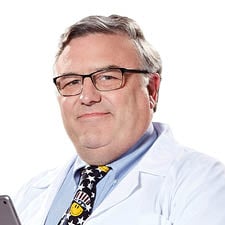As a medical student, do you ever wonder what it’s like to specialize in general surgery? Meet David Welsh, MD, a surgeon and a featured physician in the AMA’s “Shadow Me” Specialty Series, which offers advice directly from physicians about life in their specialties. Check out his insights to help determine whether a career in general surgery might be a good fit for you.
The AMA’s Specialty Guide simplifies medical students’ specialty selection process, highlights major specialties, details training information, and provides access to related association information. It is produced by FREIDA™, the AMA Residency & Fellowship Database®, which allows you to search for a residency or fellowship from more than 11,000 programs—all accredited by the Accreditation Council for Graduate Medical Education.
Learn more with the AMA about the medical specialty of general surgery.
“Shadowing” Dr. Welsh (@1980_welsh)
Specialty: General surgery.
Practice setting: Solo practice.
Employment type: Private practice.
Years in practice: Over 30 years in practice.
A typical day and week in my practice: Most days start at 7 a.m. with rounds at the hospital. Surgeries follow in the mornings with office in the afternoons. As a general surgeon in a rural setting, my practice takes me to satellite offices in small towns and several critical access hospitals. Each small town also has an extended health care facility that I visit on a regular basis. The day schedules vary with locations that my travels take me.
Saturdays are good to catch up on records and extended care facility visits. It is also a good day for visiting my farm and attending martial arts classes. Many evenings are filled with other events, such as meetings with the local board of health and attending local high school sporting events. The parents, players and coaches appreciate having a physician on the sidelines.
The most challenging and rewarding aspects of general surgery: The most challenging aspect of caring for patients as a general surgeon is the possibility of needing to deal with a wide range of surgical problems. When covering the ED on call, especially in a rural setting, a general surgeon may be called on to deal with abdominal complaints, trauma, ENT and orthopedic challenges. It is not uncommon to deal with GI complaints, internal medicine challenges and even dermatology.
How life in general surgery has been affected by the global pandemic: As a general surgeon, I have seen a direct effect on my specialty by the pandemic. Cases are being delayed due to lack of beds. People are delaying being seen for conditions and, as a result, they are presenting with much more serious circumstances. People are even delaying coming in for conditions such as appendicitis. Many surgeons are also keeping busy helping with critical care needs.
I have been keeping busy with my work in public health even as my case load in surgery has diminished. I am also a county health officer, so the pandemic has kept me busy with schools, businesses and the public in general. I have increased my interactions with government officials and the public with tasks of improving communications and making sure everyone has access to up-to-date and accurate information.
I have benefited from my contacts at the AMA, especially the AMA Council on Science and Public Health. These contacts have helped me with support and verified information. It even connected me with individuals from the Centers for Disease Control and Prevention and the United States Public Health Service Commissioned Corps.
The long-term impact the pandemic will have on general surgery: Moving forward, the experience of this pandemic will push for better communication between surgeons and the public as well as to prepare better for the next disaster. My hope is more surgeons will get involved with how their hospitals operate and have them participate in organized medicine, and be better advocates for their patients, medicine in general and their specialty specifically.
Three adjectives to describe the typical general surgeon: Hardworking. Resilient. Inquisitive.
How my lifestyle matches, or differs from, what I had envisioned: Much has changed since my time in medical school. The best example I had of a physician in practice were my family physicians. They gave me insight to some of their challenges and joys. In medical school I was exposed to the lives of general surgeons.
Each had special interests outside of medicine and they were kind and wonderful with their patients and the staff they worked with. Those experiences gave me hope for a challenging, full and enjoyable career. While in medical school I spent a month with a family physician in a small town. That experience motivated me even more to be a physician, a surgeon and to practice in a rural setting.
How does it differ? As medicine has become more complex, the effects on lifestyle and practice requirements have changed the manner and environment of practicing medicine. The sheer volume of medical knowledge and the rate at which it progresses adds to the challenge of being a good physician.
Work-life balance, raising a family, being a good general surgeon, responsive to patients’ needs, being there for your family and maintaining a personal balance is an ongoing challenge. Being aware of the risks and working to maintain one’s self and making sure you interact with family and friends helps a general surgeon be better able and capable to help their patients.
Studies have shown much in this area. In medical school, often students were told they “had to tough it out” or “if you can’t take it …” Today, through the work of our professional organizations and research results, we now realize that patient outcomes are better, and treatments are more effective, the better that physician work-life balance is maintained.
Skills every physician in training should have for general surgery but won’t be tested for on the board exam: A number of skills help a general surgeon be successful, but they are not evaluated on a board exam. Is the physician innovative? Does the surgeon think outside the box? Is there a natural and persistent drive of being inquisitive?
One question physicians in training should ask themselves before pursuing general surgery: Are you willing and able to make the sustained effort to gain and maintain the skills and knowledge required to be successful in general surgery?
Books every medical student interested in general surgery should be reading:
- Schwartz's Principles of Surgery, by Dana K. Andersen, MD, and David L. Dunn, MD, PhD.
- Harrison's Principles of Internal Medicine, by Eugene Braunwald, MD.
- The House of God, by Samuel Shem, MD.
- Also worth your time: Watch the 1991 film, “The Doctor,” starring William Hurt.
The online resource students interested in general surgery should follow: I recommend Up to Date, YouTube and the American College of Surgeons general surgery community as online resources.
Quick insights I would give students who are considering general surgery: The road is challenging, and the journey can be tough, but the rewards and the return on the efforts and investment are priceless!
Mantra or song to describe life in general surgery:
For a song, either “The Impossible Dream” or “Gonna Fly Now”—the theme from “Rocky.”
For the mantra, from the “Song of Aragorn,” by J.R.R. Tolkien: “All that is gold does not glitter / Not all those who wander are lost; / The old that is strong does not wither, / Deep roots are not reached by the frost.”




